Wake Forest apologizes for benefitting from enslaved people
 Each February, the Wake Forest University community gathers for Founders’ Day Convocation to observe the founding of the University in 1834. At this year’s event, Wake Forest President Nathan O. Hatch acknowledged the University’s participation in the institution of slavery. He offered an apology for how Wake Forest benefitted from the labor and sale of enslaved people.
Each February, the Wake Forest University community gathers for Founders’ Day Convocation to observe the founding of the University in 1834. At this year’s event, Wake Forest President Nathan O. Hatch acknowledged the University’s participation in the institution of slavery. He offered an apology for how Wake Forest benefitted from the labor and sale of enslaved people.Categories: Happening at Wake, Inclusive Excellence

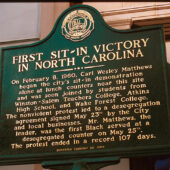 Sixty years ago, a group of students from Winston-Salem State University were joined by students from Wake Forest University to protest segregated lunch counters in Winston-Salem. A community commemoration vigil will be held Feb. 23 at 3 p.m. in downtown Winston-Salem to mark the anniversary of the historic sit-in.
Sixty years ago, a group of students from Winston-Salem State University were joined by students from Wake Forest University to protest segregated lunch counters in Winston-Salem. A community commemoration vigil will be held Feb. 23 at 3 p.m. in downtown Winston-Salem to mark the anniversary of the historic sit-in. 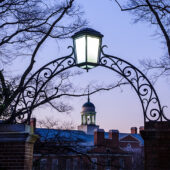 What can we learn from the past? Wake Forest University legal scholar and Associate Provost Kami Chavis explains, “If you want to have a transformative institutional change, you have to begin examining the past and the root causes of underlying issues to know what you need to do in the future.” Chavis is also co-chair of the Steering Committee of Wake Forest’s Slavery, Race and Memory Project.
What can we learn from the past? Wake Forest University legal scholar and Associate Provost Kami Chavis explains, “If you want to have a transformative institutional change, you have to begin examining the past and the root causes of underlying issues to know what you need to do in the future.” Chavis is also co-chair of the Steering Committee of Wake Forest’s Slavery, Race and Memory Project.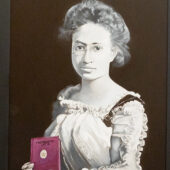 The course “Classics Beyond Whiteness” was originally limited to 15 students. Twenty-six registered. “I couldn’t turn students away,” said classics professor T.H.M. Gellar-Goad. The fall class was one of several planned courses, events and programming focusing on “Classics Beyond Whiteness” - a multidisciplinary collaboration that examines a misleading and damaging tendency to focus on white scholars and perspectives in claissical studies while excluding black voices.
The course “Classics Beyond Whiteness” was originally limited to 15 students. Twenty-six registered. “I couldn’t turn students away,” said classics professor T.H.M. Gellar-Goad. The fall class was one of several planned courses, events and programming focusing on “Classics Beyond Whiteness” - a multidisciplinary collaboration that examines a misleading and damaging tendency to focus on white scholars and perspectives in claissical studies while excluding black voices.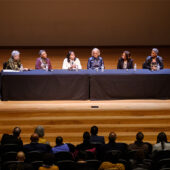 When they moved into a women’s residence hall in 1969, Beth Norbrey Hopkins and Deborah Graves McFarlane simply wanted to obtain a good education and weren’t thinking about making history as the first African American women to come to Wake Forest as resident students. But they did.
When they moved into a women’s residence hall in 1969, Beth Norbrey Hopkins and Deborah Graves McFarlane simply wanted to obtain a good education and weren’t thinking about making history as the first African American women to come to Wake Forest as resident students. But they did.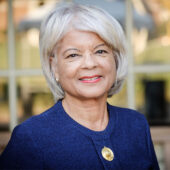 On Feb. 1, Beth Norbrey Hopkins and four other African American women will talk candidly about their experiences at Wake Forest in the early 1970s. The 9 a.m. panel discussion in Brendle Recital Hall commemorates the 50-year anniversary of the integration of women’s residence halls at Wake Forest.
On Feb. 1, Beth Norbrey Hopkins and four other African American women will talk candidly about their experiences at Wake Forest in the early 1970s. The 9 a.m. panel discussion in Brendle Recital Hall commemorates the 50-year anniversary of the integration of women’s residence halls at Wake Forest.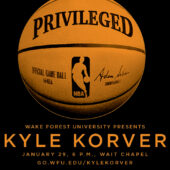 Wake Forest University will host a moderated conversation between NBA All-Star Kyle Korver and Dean of the School of Divinity Jonathan Walton on Jan. 29 in Wait Chapel at 6 p.m.
Wake Forest University will host a moderated conversation between NBA All-Star Kyle Korver and Dean of the School of Divinity Jonathan Walton on Jan. 29 in Wait Chapel at 6 p.m.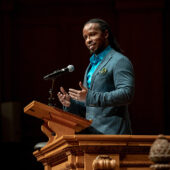 Ibram X. Kendi, a professor of history and international relations and founding director of the Antiracist Research and Policy Center at American University, delivered the Martin Luther King Jr. keynote address inside Wait Chapel on Jan. 20.
Ibram X. Kendi, a professor of history and international relations and founding director of the Antiracist Research and Policy Center at American University, delivered the Martin Luther King Jr. keynote address inside Wait Chapel on Jan. 20.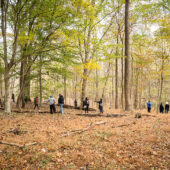 During a November bus trip to Wake Forest University’s original campus, Professor Derek Hicks took 21 students to a nondescript cemetery where many of the tombstones had carvings but no names. He wanted his African American Religious Experience class to visit the cemetery because of its ties to a chapel where enslaved people who helped build the original campus once worshipped.
During a November bus trip to Wake Forest University’s original campus, Professor Derek Hicks took 21 students to a nondescript cemetery where many of the tombstones had carvings but no names. He wanted his African American Religious Experience class to visit the cemetery because of its ties to a chapel where enslaved people who helped build the original campus once worshipped.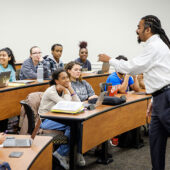 On Nov. 8, Magnolia Scholars at Wake Forest University gathered at Tribble Hall to celebrate the 10-year anniversary of a prestigious program that provides scholarships, academic support, study abroad opportunities and counseling for 120 first-generation students.
On Nov. 8, Magnolia Scholars at Wake Forest University gathered at Tribble Hall to celebrate the 10-year anniversary of a prestigious program that provides scholarships, academic support, study abroad opportunities and counseling for 120 first-generation students.